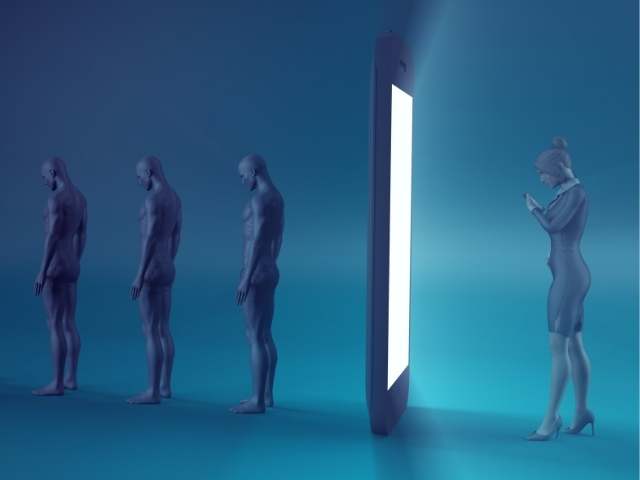
Do you know how the worlds of drugs and technology are alike? In both there is addiction. In this article you will know what is addiction to social mediahow to know if you have one and how to avoid it.
We usually go with the herd. We were raised to be just another sheep. For this reason it seems normal and acceptable to us to do what the majority does regardless of whether it is right or wrong.
The philosopher, author and speaker, Jiddu Krishnamurti, said the following:
“It is not a measure of health to be well, adapted to a deeply sick society.”
In this case, it is not right for you to spend a lot of time on social networks, regardless of what the majority does.
The point is that it is not easy to break away from standards, especially when our habitat is digital…
We pay bills online; we get transportation and food through apps; and we have all the entertainment we need on social media. In other words, it is very easy to fall into the trap of Social networks addiction and technology in general.
However, one way to pause and reflect is to see how the leaders of technology companies limit the use of technology to their families:
- Bill Gates did not let his children use cell phones when they were under 14 years old.
- Evan Spiegel, founder of Snapchat, only allowed his son an hour and a half of screen time a week.
- Steve Jobs did not let his children use the iPad.
- Sundar Pichai, CEO of Google, limits the time his children can watch TV.
Imagine a priest who tells his children not to believe too much in God…You immediately think that there is something wrong.
What is addiction to social media
Addiction to social networks It is a behavioral addiction defined by being overly preoccupied with social media, driven by an uncontrollable desire to use it and spend so much time and effort on it that it affects other important areas of life.
Before seeing if you meet the characteristics of a person addicted to networkslet’s see why they are so addictive.
Why are social networks so addictive?
The origin lies in instant gratification. A simple action brings a good result.
Just putting a finger to move on to the next story or sliding to see the next reel, you get rewards in the form of dopamine signals; the same ones that are sent when you gamble or consume recreational drugs.
When rewards are delivered randomly (such as with a slot machine or positive social media interaction), receiving the reward is easy, dopamine triggering behavior becomes a habit.
It is also important to think that our brain is the same as thousands of years ago. This has given man a long time to learn how to manipulate the mind; not in vain social media algorithms know exactly how to get more and more of our attention and sell it to the highest bidder.
And as if that were not enough, social networks are free. This democratizes its use and therefore increases the chance of addiction.
How to know if you have a social media addiction
The only one who can give an official diagnosis is a specialist. However, several patterns have been identified that could indicate that you have an addiction to social networks:
- You think a lot about social media. To the point that you connect to them as soon as you get the chance.
- Your mood changes when your use of social media decreases.
- You often use social media to escape your problems.
- You use them even when you are doing other activities.
- Your results at school and/or work decline.
Before seeing the Disadvantages of Social Media Addiction and some strategies to avoid it, I would like to ask you a favor. Simply vote from 1 to 5 to see how you’ve found this article so far. Thank you very much!
Disadvantages of addiction to social networks.
It is clear that an addiction has disadvantages. However, it is important to know them to have extra motivation and change our habits, so as not to let addiction take advantage of our weaknesses.
Resource consumption.
Have you ever eaten so much to the point that you feel sleepy? The body needs energy to do the digestion process. And if you eat more, your body will consume more energy.
The same happens with your brain and the information it must process. Therefore, the more information you consume, your brain will distribute its capacity for concentration in more parts.
Use of time.
How much time do you spend on social media? According to the Statista portal, the average consumption is 145 minutes a day. Assuming you’re going to use social media for 20 more years, you’d spend almost 2 years!
In a year you can live incredible experiences… Do you prefer to see the world from a screen? Think of everything you can learn to improve your quality of life. Everything you can share with your family and friends. All the people you can meet. All the books you can read…
Low productivity.
Do you know how long it takes people to open an email as soon as it arrives?…Just 6 seconds. At first glance it does not seem to be relevant data, but there is something called Attention Residue, which causes our productivity to plummet.
Low self-esteem.
For many people, social networks are the ideal space to show their best moments. And to the extent that it is the only thing you see, you will tend to compare your life against a wrong perception of the reality of others.
Increased loneliness.
If you prefer to immerse yourself in your mobile instead of interacting in person, you will fall into a vicious circle where you will be left more and more alone.
FOMO (fear of missing out)
It is the fear of missing out on the opportunity. In this case, it is the fear of not being aware of the latest information.
Disrupted sleep patterns.
If you usually watch social networks late at night or at dawn, it is likely that you cannot fall asleep peacefully.
Decrease in physical activity.
It’s very simple, the time you’re on social media is the same time you’re not exercising.
Strategies to reduce the use of social networks.
The first step to start making changes is to recognize that you must make them. Therefore, if you recognize patterns of addiction to social networks, do not worry. There are still many things you can do to reduce your use and regain control of your time.
- Uninstall the apps from your mobile phone and use them exclusively from the PC. Facebook, Instagram, Snapchat and others have web versions.
- Disable notifications from your mobile. I know it’s very tempting to see who likes your photos, but you don’t have to know as soon as they do.
- Turn off your mobile when you are doing other activities, such as working, sharing with your friends or studying.
- Allocate a specific time to the use of social networks. Set alarms that help you not use more time than indicated.
- If it is impossible for you to turn off your mobile, because perhaps you are waiting for a call, leave it outside the room you are in; so that you do not have the facility to review it every moment.
- If you don’t have a hobby, look for activities that aren’t related to technology. Like cooking, painting, practicing a sport; etc. Any activity you enjoy that takes you away from your cell phone will do.
- Look for more spaces to share with your family and friends.
conclusions.
Technology is extremely useful, it’s undeniable! And social networks are excellent allies if we know how to use them. But when it gets out of control and we don’t realize the amount of time we spend on them, we enter a path that does not lead to anything good.
The good news is that there are alternatives to reduce the use of social networks and they are easy to apply.
We hope the information in this article is useful to you. And if you think that your relatives can use it, do not hesitate to share 🙂
And remember, if you are really interested in creating your own business, you can read our book “How to create a company while working: Discover how to manage your time, manage your money and motivate yourself while creating a company and working for another” , where you will find all the information you need to found your own company, without having to leave your job.


